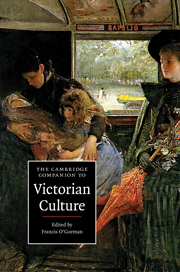4 - Economics and business
Published online by Cambridge University Press: 28 July 2010
Summary
For the first three decades of the Victorian age, economic writing and economic development proceeded along paths that joined at every opportunity. Not only did much economic writing directly inform policies that altered the relations between land, labour and capital, it also shaped economic behaviour by alternately generating perceptions of stability and uncertainty. Although some of this writing found its way into textbooks or specialist monographs, equally sophisticated and/or influential analyses of economic activity were as likely to appear in tracts, sermons, speeches or periodicals intended for the lay public. This situation started to change in the 1870s, and by the 1890s an avowedly less 'political' discipline of economics had begun to distinguish itself from genres of 'literary' economics, which persisted in the lay press. This new writing, which would mature in the twentieth century as neoclassical economics, appeared in new professional journals and in textbooks designed for mathematically trained specialists. Broadly speaking, it accompanied a maturing economy, for which much of the political framework had been set by earlier debates.
- Type
- Chapter
- Information
- The Cambridge Companion to Victorian Culture , pp. 61 - 79Publisher: Cambridge University PressPrint publication year: 2010
- 1
- Cited by

